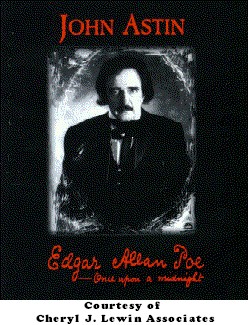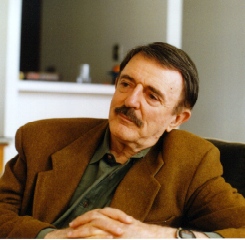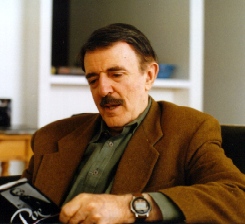|
After
seeing John Astin in his one-man play, Edgar Allan Poe-Once upon a midnight, I
looked forward to the possibility of spending a couple of hours talking with him about his
life and that of Poe's. I made several calls to Astin's publicist to schedule a time and
was told that they had to limit the number of interviews that they could grant. She told
me that her company would evaluate each request and then decide which writer would be
given time with Astin. My excitement about ever sitting down with him was now dampened.
You can imagine how excited I was when his publicist called to tell me that I had been one
of the few writers that would get to talk with him. Then she added, "You will have
thirty minutes for the interview." Gone was my leisurely chat over coffee with John
Astin. However, after completing an interview that actually lasted nearly an hour, I
regretted not having an entire afternoon with this very gentle and learned man. Al: The Addams Family has become a TV icon and is still funny years later. John: Just your smile now is an indication that there is something good about the character of Gomez. I wouldn't trade the association with him for anything or any role that I might have missed. Al: There was never a moment in the play that I experienced a flashback and saw you as Gomez. John: Thank you. There is a Poe that people expect to see. However, there is a witty and occasionally joyful Poe that the audience doesn't expect. In this respect, he isn't dissimilar to Gomez. But that Poe can't be presented immediately in the play because of the confusion that might result. Al: When will you be taking Poe to Broadway now that your engagement here has been extended through at least October? John: I was encouraged to go to New York last April. I decided not to do so probably selfishly. I love to play for audiences that are simply made of people rather than so-called special people. It is important to me that what Poe has to say gets across to people. I want to give people the feeling that I get from all this. I think that we are succeeding. The feedback is very warm. People are transported to that space that Poe wanted to make available to us. I wanted just to see how a straight Midwestern audience would receive the play. Chicago is a good theater audience, and they like to go to the theater. Also, due to the combination of Poe and me, I have been bringing people into the theater that don't often go to plays. I think this combination intrigues some people who aren't normally theatergoers. As far as New York is concerned, I don't know. I want to stay here in Chicago at the Mercury Theater as long as we can and then go on. No matter, we will ride, boldly ride whether over the Mountains of the Moon or down the Valley of the Shadow--to paraphrase Poe's Eldorado. Al: What does that poem mean to you? John: Eldorado is a summation of the philosophy of this play: no matter what happens in life, you suffer that which is to suffer, enjoy that which is to enjoy, and you keep on riding forward with boldness and courage. That courageous journey through this life is Eldorado. It is nothing outside of our lives. It is not another land where we will find solutions to all of our problems. Eldorado is in our own lives. If we learn to challenge the Mountains of the Moon with boldness and ride through that shadowed valley, we will live Eldorado.
Al: Does the latter-day Poe, John Astin, have any troubling concerns? John: We are running ourselves into a damaged earth. But, I am optimistic. I believe that we can change; we must change. As a human race, we are very young and quite primitive. The sooner we learn the greatness of humanity the better off we will all be. 8/97 Check out the article with John Astin and more at www.astin-poe.com/ |







 Al: Everyone knows you as Gomez, the eccentric patriarch of the sitcom, The
Addams Family. Has being so heavily associated with Gomez helped or hindered you when
you do more serious projects like this one-man explanation of Poe's life?
Al: Everyone knows you as Gomez, the eccentric patriarch of the sitcom, The
Addams Family. Has being so heavily associated with Gomez helped or hindered you when
you do more serious projects like this one-man explanation of Poe's life? Al: On a personal note, it seems a bitter twist to play a character with a
drinking problem and to have been married to a person who also suffered from alcoholism.
Wasn't the play a little too close for comfort?
Al: On a personal note, it seems a bitter twist to play a character with a
drinking problem and to have been married to a person who also suffered from alcoholism.
Wasn't the play a little too close for comfort? Al: During the play, I was struck by how Poe seemed to be ahead of his
times when it came to his understanding of the universe. He attempted to wrestle with
astronomy, near death experiences, and understanding time and space.
Al: During the play, I was struck by how Poe seemed to be ahead of his
times when it came to his understanding of the universe. He attempted to wrestle with
astronomy, near death experiences, and understanding time and space.